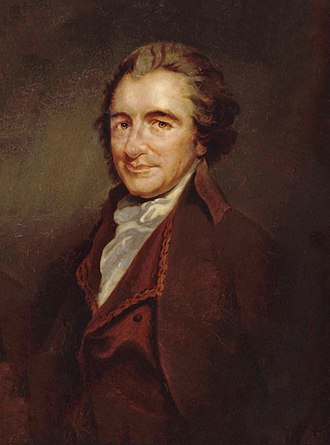Thomas Paine
From Wikipedia, the free encyclopedia
Tomas Pejn (engleski: ; Tetford, 29. januar 1737 — Njujork, 8. jun 1809) je bio američki pisac i revolucionar rođen u Britaniji. Odrastao u porodici kvekera. U Ameriku je otišao 1774. i u Ratu za nezavisnost borio se na strani kolonista. Vratio se u Englesku 1789. ali pošto je optužen za izdaju pobegao je u Francusku gde je bio pristalica republikanizma. Za vreme jakobinske diktature jedva je izbegao giljotinu. Pejnov radikalizam spojio je privrženost političkoj slobodi sa snažnom verom u suverenitet naroda što je inspirisalo i liberalni republikanizam i socijalistički egalitarizam.
| Thomas Paine | |
|---|---|
| Prosvjetiteljstvo | |
| Zapadna filozofija | |
 | |
| Rođenje | 29. siječnja 1737., Thetford |
| Smrt | 8. lipnja 1809., New York |
| Filozofija | |
| Škola/Tradicija | Prosvjetiteljstvo, liberalizam, republikanizam, radikalizam |
| Glavni interesi | Religija, politika |
| Inspiracija | |
Na
| |
U decembru 1793 je uhapšen i zatvoren u Parizu, a zatim pušten 1794. Razlog hapšenja je njegova knjiga Doba Razuma u kojoj se objašnjava Deizam, promoviše razložno rasuđivanje, slobodno mišljenje i zalaže protiv institucionalizovane religije, posebno hrišćanske doktrine. U Ameriku se vratio 1802. Umro je 8. juna 1809 u Njujorku. Samo šest ljudi je prisustvovalo njegovoj sahrani jer je bio izopšten zbog njegovog omalovažavanja hrišćanstva [1].
Dela
Njegova najznačajnija dela su:
U delu "Doba razuma", Tomas Pejn kaže: Ja ne verujem u veru koju ispoveda jevrejska crkva, rimska crkva, grčka crkva, turska crkva, protestantska crkva, niti bilo koja crkva, koliko ja znam. Moj um je moja sopstvena crkva. Sve te institucionalizovane crkve, ... meni izgledaju kao ljudske tvorevine, izmišljene da zastraše i porobe čovečanstvo, ako i da monopolizuju moć i profit.
Reference
Literatura
Vanjske veze
Wikiwand - on
Seamless Wikipedia browsing. On steroids.
